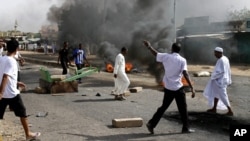KHARTOUM —
Sudanese police fired tear gas at anti-government protesters in the capital Khartoum on Wednesday, witnesses and activists said, as dissent against the lifting of fuel subsidies spread.
Demonstrators set a university building and several gas stations on fire and blocked the main road to the airport near the Rotana luxury hotel, witnesses said.
A Reuters reporter saw police fire tear gas volleys into the crowd, while hundreds of officers and plainclothes security agents armed with guns or batons rushed to the city center. Others were sitting on the roof of government buildings.
Agents detained some 20 protesters who were driven away in pickup trucks, a witness said.
Internet access became unavailable in Khartoum, although it was not immediately clear if the authorities had cut the service to stop activists from coordinating protests via social media.
There was no word on casualties in Wednesday's unrest. Two people were killed during protests in the Khartoum area on Tuesday, relatives who named the victims told Reuters.
Police have only confirmed one death that day, saying a robber had killed an unnamed man. Activists have blamed government forces for the man's death.
Seeking to bridge its ballooning budget deficit, the government lifted fuel subsidies on Monday, a measure which has hit the poor and is likely to accelerate inflation.
Public anger against Bashir rising
President Omar Hassan Bashir, in power since 1989, has avoided the sort of Arab uprisings that have ousted autocrats in Tunisia, Egypt and Libya, but popular anger is rising over corruption and a worsening economic crisis.
Sudan lost three-quarters of its oil reserves - its main source of revenue and of dollars for food imports for its 32 million people - when South Sudan became independent in 2011.
The government reduced some fuel subsidies in July 2012, prompting several weeks of modest protests and a security crackdown. This week's marches were larger than last year's but still dwarfed by those in Egypt or other Arab countries.
Sudan's opposition parties, run by older men, are weak, divided and have little appeal for young people demanding drastic democratic changes.
Khartoum had hoped to maintain some fuel subsidies by boosting gold exports to replace oil revenues, but it was thwarted by the recent fall in global gold prices.
The government says annual inflation eased to 23.8 percent in July from 37.1 percent in May, but independent analysts put the actual rate at 50 percent or even higher.
Demonstrators set a university building and several gas stations on fire and blocked the main road to the airport near the Rotana luxury hotel, witnesses said.
A Reuters reporter saw police fire tear gas volleys into the crowd, while hundreds of officers and plainclothes security agents armed with guns or batons rushed to the city center. Others were sitting on the roof of government buildings.
Agents detained some 20 protesters who were driven away in pickup trucks, a witness said.
Internet access became unavailable in Khartoum, although it was not immediately clear if the authorities had cut the service to stop activists from coordinating protests via social media.
There was no word on casualties in Wednesday's unrest. Two people were killed during protests in the Khartoum area on Tuesday, relatives who named the victims told Reuters.
Police have only confirmed one death that day, saying a robber had killed an unnamed man. Activists have blamed government forces for the man's death.
Seeking to bridge its ballooning budget deficit, the government lifted fuel subsidies on Monday, a measure which has hit the poor and is likely to accelerate inflation.
Public anger against Bashir rising
President Omar Hassan Bashir, in power since 1989, has avoided the sort of Arab uprisings that have ousted autocrats in Tunisia, Egypt and Libya, but popular anger is rising over corruption and a worsening economic crisis.
Sudan lost three-quarters of its oil reserves - its main source of revenue and of dollars for food imports for its 32 million people - when South Sudan became independent in 2011.
The government reduced some fuel subsidies in July 2012, prompting several weeks of modest protests and a security crackdown. This week's marches were larger than last year's but still dwarfed by those in Egypt or other Arab countries.
Sudan's opposition parties, run by older men, are weak, divided and have little appeal for young people demanding drastic democratic changes.
Khartoum had hoped to maintain some fuel subsidies by boosting gold exports to replace oil revenues, but it was thwarted by the recent fall in global gold prices.
The government says annual inflation eased to 23.8 percent in July from 37.1 percent in May, but independent analysts put the actual rate at 50 percent or even higher.





